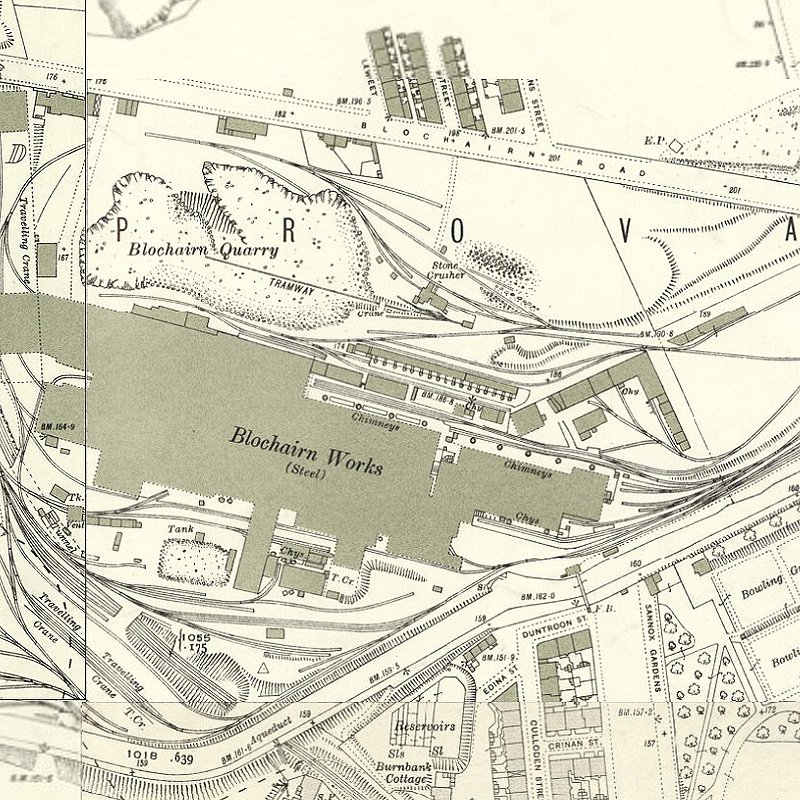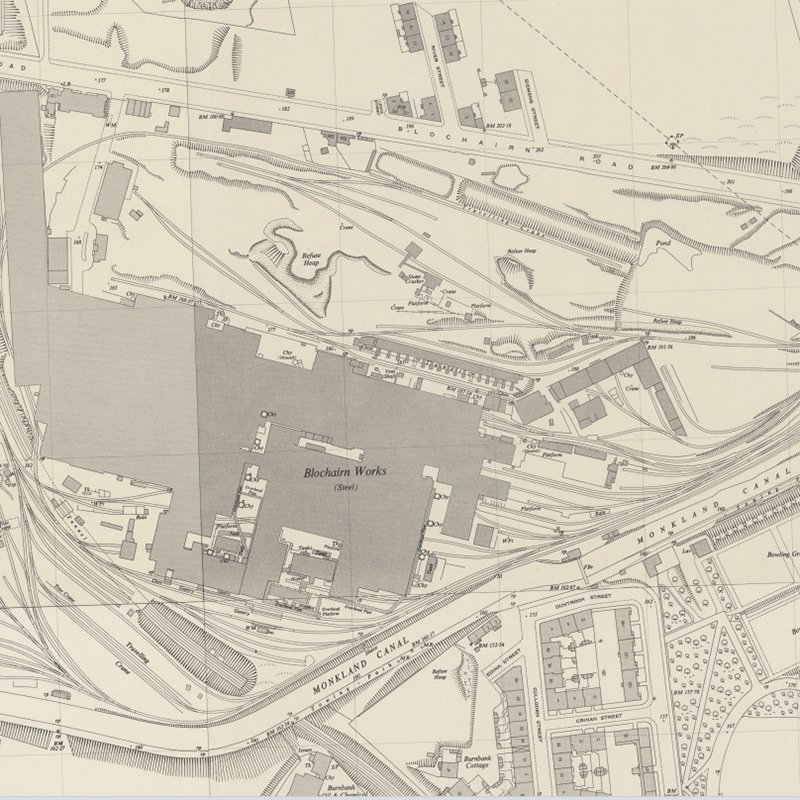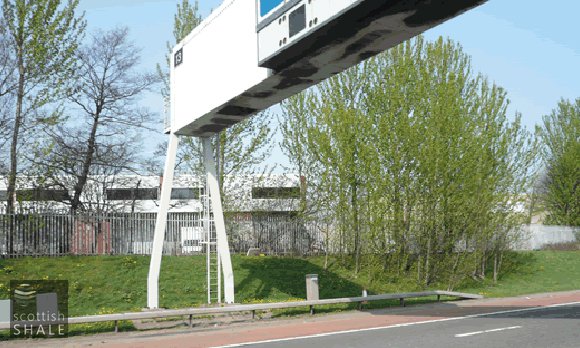- Aberdeen Oil Works
- Addiewell Oil Works
- Almondhill Oil Works
- Annick Lodge Oil Works
- Arden Oil Works
- Armadale Oil Works
- Auchenheath Oil Works
- Avonhead Oil Works
- Balgray Oil Works
- Ballat Oil Works
- Bathgate Oil Works
- Bathville Oil Works
- Bellsdyke Oil Works
- Bellsquarry Oil Works
- Benhar Oil Works
- Binnend Oil Works
- Birkenshaw Oil Works
- Bishop Street Oil Works
- Blackburn Oil Works
- Blackstone Oil Works
- Blackstoun Oil Works
- Blochairn Oil Works
- Boghall Oil Works
- Bredisholm Oil Works
- Breich Oil Works
- British Asphalte Oil Works
- Broxburn Oil Works
- Broxburn - Bell's Stewartfield Oil Works
- Broxburn - Albyn Oil Works
- Broxburn - East Mains Oil Works
- Broxburn - Greendykes Oil Works
- Broxburn - Hallfarm Oil Works
- Broxburn - Hutchinson's Oil Works
- Broxburn - Poynter's Oil Works
- Broxburn - Steele's Oil Works
- Broxburn - Steele's Stewartfield Oil Works
- Buckside Oil Works
- Burngrange Oil Works
- Calderbank Oil Works
- Canalbank Oil Works
- Champfleurie Oil Works
- Clippens Oil Works
- Cobbinshaw North Oil Works
- Cobbinshaw South Oil Works
- Coneypark Oil Works
- Craigie Oil Works
- Crown Point Oil Works
- Dalmeny Oil Works
- Deans Oil Works
- Doura Oil Works
- Drumbow Oil Works
- Drumcross Oil Works
- Drumgray Oil Works
- Dryflat Oil Works
- East Fulton Oil Works
- East Hermand Oil Works
- Eldin Oil Works
- Falkirk Oil Works
- Fergushill Oil Works
- Forthbank Oil Works
- Forth & Clyde Oil Works
- Gavieside Oil Works
- Grange Oil Works
- Grangepans Oil Works
- Greengairs Oil Works
- Hareshaw Oil Works
- Hartwood Oil Works
- Hawick Oil Works
- Hermand Oil Works (1866)
- Hermand Oil Works (1883)
- Holmes Oil Works
- Hopetoun Oil Works
- Hurlford Oil Works
- Inkerman Oil Works
- Inverkeithing Oil Works
- Kilrenny Oil Works
- Kilwinning Oil Works
- Kirkmuirhill Oil Works
- Kirkwood Oil Works
- Lanark Oil Works
- Lanemark Oil Works
- Levenseat Oil Works
- Limerigg Oil Works
- Linwood Oil Works
- Loanhead Oil Works
- Lochburn Road Oil Works
- Lochgelly Oil Works
- Longrigg Oil Works
- Magdalene Oil Works
- Methil Oil Works
- Millburn Oil Works
- Nettlehole Oil Works
- Niddry Castle Oil Works
- Nitshill Oil Works
- Oakbank Oil Works
- Palacecraig Oil Works
- Pathhead Oil Works
- Patterton Oil Works
- Pentland Oil Works
- Philpstoun Oil Works
- Port Dundas Oil Works
- Possil Oil Works
- Pumpherston Oil Works
- Raebog Oil Works
- Riggend Oil Works
- Rochsoles Oil Works
- Rochsolloch Oil Works
- Roman Camp - Almondfield Oil Works
- Roman Camp - Cawburn Oil Works
- Roman Camp Oil Works (1892)
- Roman Camp - Shale Oil Works
- Rosebank Oil Works
- Roughcraig Oil Works
- Rumford Street Oil Works
- Seafield Oil Works
- Shawsburn Oil Works
- Sheepford Locks Oil Works
- Shettleston Oil Works
- Shotts Oil Works
- Stand Oil Works
- Stanrigg Oil Works
- Stonehouse Oil Works
- Straiton Oil Works
- St. Rollox Works
- Swinehill Oil Works
- Tarbrax Oil Works
- Uphall Oil Works
- Uphall - Railway Oil Works
- Uphall - Wyllie's Oil Works
- Vulcan Chemical Works
- Wardend Oil Works
- Wattston Oil Works
- Westfield & Capeldrae Oil Works
- Westwood Oil Works (1941)
- Westwood Oil Works (1866)
- Whitebog Oil Works
- Whitehill Oil Works (Lanarkshire)
- Whitehill Oil Works (Midlothian)
- Whiterigg Oil Works
- Woodhall Oil Works
Blochairn Oil Works
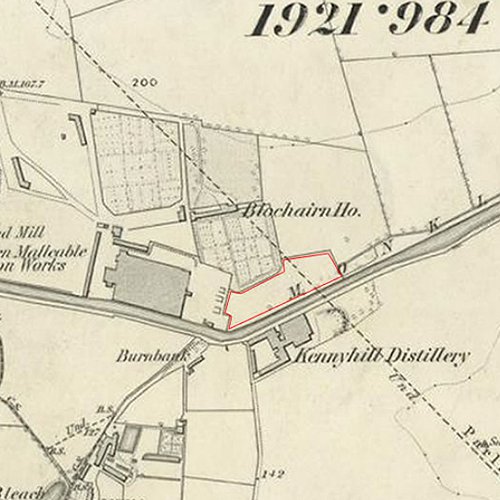
Evidence suggests that Blochairn Chemical Works were established to refine coal tars and imported petroleum, but increasingly focussed on the refining of Scottish paraffin oils and was latterly known as Blochairn Oil Works. There is no indication that coal or shale was retorted on site. The works are not listed by Redwood.
In 1870 Blochairn Chemical Works and their senior proprietor Robert Binning were subject of a lengthy court case in which the local parish board alleged that the works produced "a disgusting, nasty, loathsome, and nauseous smell". As a consequence, a ban was imposed on the works burning paraffin coke as a fuel. Robert and John Binning, the sole partners in Robert Binning & Son, were also copartners in the Clippens Shale Oil Company, concerned with the development of Clippens Oil Works.
The Machinery and Plant of Blochairn Oil Works were sold off in 1873 and it seems likely that the site was subsequently subsumed into that of Blochairn Steel Works, constructed by the Steel Company of Scotland during the 1880's. Little trace survives of this industrial landscape; the steel works closed in 1958 and its site is now occupied by Blochairn Market and other commercial premises. The Monkland Canal was infilled in advance of the construction of the M8 Monkland Motorway in about 1980.
The works, sited on Garngad Hill Road, cannot be clearly identified from available OS maps; the suggested location is derived from the description in the sales notice that the works were "immediately east of Blochairn Iron Works".
Mapped by the Ordnance Survey of c.1865, with possible site of oil works marked in red.
Archive images
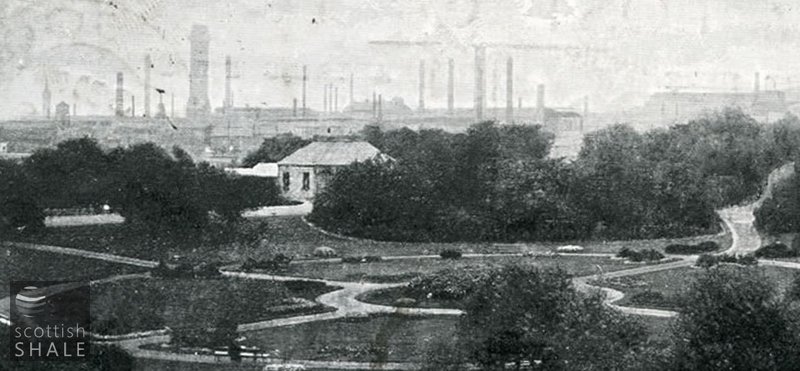
Detail of postcard, c.1910 showing the view across Alexandra Park towards Blochairn Steelworks, which were constructed on the site of Blochairn Chemical Works.
COX BROTHERS v BINNING & SON
In this action the pursuers, merchants and commission agents in Liverpool sued Binning & Son, coal-tar and petroleum distillers, Blochairn, near Glasgow...
Scotsman, 20th December 1867
.......
GLASGOW- NUISANCE REMOVAL CASE
Yesterday Sheriff Bell pronounced decision in an action at the instance of the Barony Parochial Board, Glasgow, as Local Authority under the Public Health (Scotland) Act 1862, against R. Binning & Sons, paraffin oil and coal-gas distillers, Blochairn Chemical Works. The petitioners set forth that an effluvia, offensive and injurious to health, was emitted by the works of Messrs. Binning, and asked his Lordship to ordain the respondents to discontinue the nuisance complained of.
Scotsman, 3rd December 1870
.......
FOR SALE. TO BE SOLD at the BLOCHAIRN CHEMICAL WORKS, GARNGAD HILL ROAD, GLASGOW on WEDNESDAY, 12TH FEBRUARY 1873, at One o’clock P.M., The MACHINERY and PLANT of the PARAFFIN OIL WORK, known as the “THE BLOCHAIRN CHEMICAL WORKS” carried on for some time by Robert Binning & Son, consisting of
Ten M.I. Stills with Worms, Furnaces, &c.; Five Malleable Iron Condensers for do,; Saddle-shaped Egg-end, and Cylinder Boiler, with and without connections; Two Cast-Iron Stills; 30-cwt. Derrick Crane, Crank Overhead Steam-Engine. 7-inch Cylinder, 14-inch stroke, with Fly-Wheel, Crank, Shaft, and Connections; Five Steam Hydraulic and Oil Pumps; Shafting, Gearing and Belting. Circular and Square Agitators; Iron Tanks; California Pumps; Zinc and Wooden-lined Tanks; Large Quality Cast and Malleable Iron Pipes, from 1-inch to 3-inch, with connections; Cast-iron and Brass Cocks and Valves; Lead Pipe; Four Carts and Butts; Iron Barrow; Boggies; Malleable and Cast-Iron Scraps; Oil Drums from 5 to 20 Gallons; Three Drum Presses and Connections; Bramah Press, with Connections, by A & P Steven; Galvanised Coolers; Capital Lorry; Weighing Machine, Office Furniture, &c.
The GROUND on which the Works stand will be SOLD by Private Bargain. It is outwith the Municipal Boundary, and lies immediately East of Blochairn Iron Works, and it extends to Three Acres Two Roods and Four Poles. It adjoins the Banks of the Forth and Clyde Canal, the intervening Ground being held on Lease by the Proprietors. Feu-duty, £105, 16s. 10d. AN OMNIBUS will leave the Exchange, Queen Street at a Quarter to One on 12th FEBRUARY, and Convey Purchasers to Blochairn. Catalogues of the Machinery and Plant will be Furnished by Mr. ROBERT BINNING, Clippens Shale Oil Company.
Scotsman, 10th February 1873
.......
THE CLIPPENS SHALE OIL COMPANY
Paraffin Oil Manufacturers. Bloclairn, near Glasgow.
Our works are situated on the banks of the Monkland Canal. Employ 130 hands. Rateable value of works 405l. Obtain supply of water from the canal, and consume about 10,000,000 gallons yearly. Use yearly 21,000 tons of bituminous shale, 500 tons of sulphuric and other acid, and 200 tons of caustic soda. Produce crude paraffin, 150 tons ; lubricating oil, 130,000 gallons; illuminating oil, 400,000 gallons.
The condensed water separated from the tar after removal of naphtha is evaporated. The spent sulphuric acid, and the spent caustic soda, and tarry matter, after first and second purifying processes are recovered, and the tar is burnt. The other liquid refuse produced flows into the stream. The spent shale is deposited in heaps near the pits. Use steam, 25 nominal horse-power. Consume yearly 8,000 tons of coal, the ashes from which are deposited in heaps. The excrements of our workpeople are carted away and used for manure.
Have no suggestions to offer.
From Report on the Pollution of Scotch Rivers to the Rivers Pollution Commissioners, 1873



